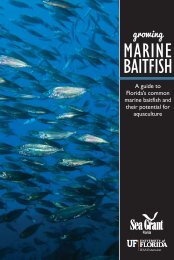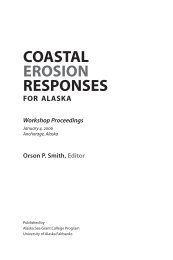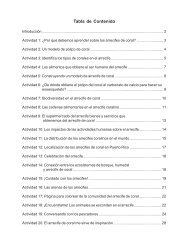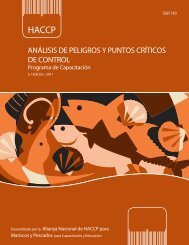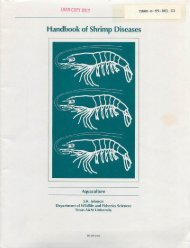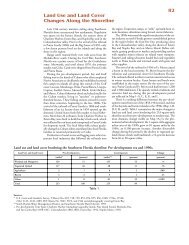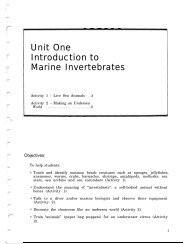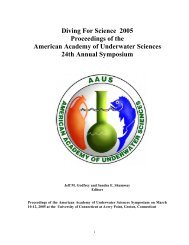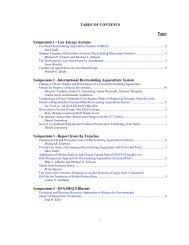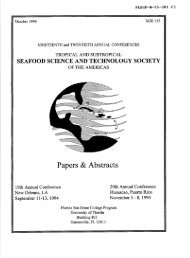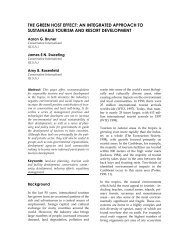Full document / COSOC-W-86-002 - the National Sea Grant Library
Full document / COSOC-W-86-002 - the National Sea Grant Library
Full document / COSOC-W-86-002 - the National Sea Grant Library
- TAGS
- nsgl.gso.uri.edu
You also want an ePaper? Increase the reach of your titles
YUMPU automatically turns print PDFs into web optimized ePapers that Google loves.
Inextricably wound up with religion—a taboo in public discussion.<br />
Thus, when formal ethical analysis occurs at all in environmental<br />
Issues, it is done by academics vho publish articles in philosophy<br />
Journals, by members of Greenpeace or similar conservation<br />
organizations at <strong>the</strong>ir Informal meetings, or by scientists who debate<br />
ethical choices in <strong>the</strong> privacy of faculty lounges.<br />
To put it simply, policy analysis is what goes on when<br />
decisionmakers meet. Ethical analysis is what goes on when those same<br />
decisionmakers lie awake at night in <strong>the</strong> privacy of <strong>the</strong>ir homes.<br />
Policy Analysis of Ocean DumpInn<br />
It is now widely recognized that <strong>the</strong> ocean is not a single<br />
environment, but ra<strong>the</strong>r an interrelated web of blogeographlcal and<br />
physical units, such as estuaries, unveiling zones and mldocean gyres,<br />
that are vulnerable to human abuse In widely varying degrees. Of all<br />
<strong>the</strong> earth's environments, <strong>the</strong> open ocean away from <strong>the</strong> productive<br />
continental shelves may be <strong>the</strong> least vulnerable to <strong>the</strong> influence of<br />
human activity, while coastal and estuarine areas are among <strong>the</strong> most<br />
vulnerable. For this reason, if for no o<strong>the</strong>r, resource managers will<br />
face increasing pressure to direct waste products and deflect<br />
environmental stress away from <strong>the</strong> coastline to <strong>the</strong> open ocean.<br />
This will occur for two primary reasons: (1) land-based disposal<br />
options will become less available and more expensive; and (2) ocean<br />
preservationists like Greenpeace or <strong>the</strong> Oceanic Society or <strong>the</strong> Cousteau<br />
Society, while articulate and determined, arc numerically weaker than<br />
advocates of any o<strong>the</strong>r type of environment on earth. No one lives In<br />
<strong>the</strong> open ocean, and hence it has no voting constituency.<br />
In recent years some scientists and policy analysts have suggested<br />
that ve are being overly protective of <strong>the</strong> ocean at <strong>the</strong> expense of our<br />
groundwaters and our coastal zone. (See, e.g., Charles Ostcrberg,<br />
"Rubbish on <strong>the</strong> High <strong>Sea</strong>s," Newswook, Oct. 7, 1985 at 18.) Some<br />
believe that <strong>the</strong> protectionist approach of <strong>the</strong> 1970s is about to<br />
backfire on us, by degrading our coastal resources and our groundwaters<br />
as a result. Opinions are strongly divided on <strong>the</strong> use of <strong>the</strong> deep<br />
ocean as waste space, and <strong>the</strong> division occurs along several lines of<br />
bifurcation.<br />
Dispersion vs. concentration<br />
Some favor concentration and isolation in <strong>the</strong> treatment of wastes,<br />
and o<strong>the</strong>rs favor its opposite, dispersion or dilution to <strong>the</strong> point of<br />
insignificance. The appropriateness of each view will vary according<br />
to <strong>the</strong> type of waste product under discussion. There is widespread<br />
agreement, for example, that In <strong>the</strong> case of sewage sludge, dispersal is<br />
better than concentration. Manure Is valuable when spread equably over<br />
<strong>the</strong> countryside, but noxious when ga<strong>the</strong>red in a heap; and some<br />
oceanographers believe <strong>the</strong> same argument applies to <strong>the</strong> ocean. It is<br />
also widely agreed that <strong>the</strong> opposite la true In <strong>the</strong> case of radvastes.<br />
Close-monitoring vs."final" disposal<br />
Some advocate disposal of waste products by putting <strong>the</strong>m in <strong>the</strong><br />
remotest possible place, and o<strong>the</strong>rs prefer to keep <strong>the</strong>m nearby where we<br />
can watch <strong>the</strong>m. Advocates of keeping a close vatch on radvastes, for<br />
example, tend to favor land emplacement. Wc don't know enough about<br />
<strong>the</strong> deep marine environment to place any hazardous material <strong>the</strong>re<br />
695



